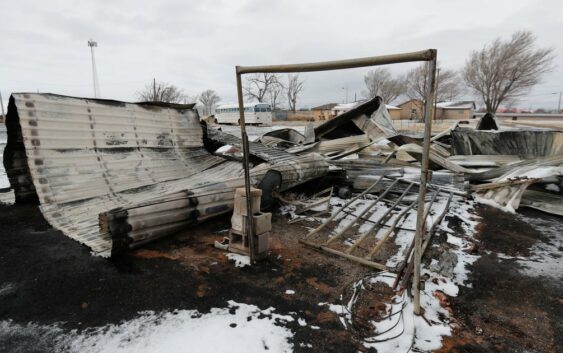- One set of evacuation orders lifted in Caldwell County after wildfire contained
- 'We gutted every building' | Chimney Rock rebuilding after Hurricane Helene
- 'We gutted every building' | Chimney Rock rebuilding after Hurricane Helene
- Debris from Hurricane Helene provides fuel, complicates containment for spring wildfires
- David & Nicole Tepper increase Hurricane Helene relief commitment to $750k
Decayed power pole sparked the largest wildfire in state history, Texas House committee confirms

Sign up for The Brief, The Texas Tribune’s daily newsletter that keeps readers up to speed on the most essential Texas news.
LUBBOCK — A decayed utility pole that broke, causing the power line to fall on dry grass in the Texas Panhandle, sparked the state’s largest wildfire in history, a Texas House committee confirmed Wednesday.
And other poorly maintained power equipment sparked four additional fires across the region earlier this year, the committee said.
The committee also found that a lack of readily available air support, ineffective communication from faulty equipment and coordination among agencies inhibited on-the-ground efforts to contain the Smokehouse Creek fire and others that ravaged the Panhandle earlier this year.
In response, the committee made up of three House members and two landowners recommended the Legislature have more effective monitoring and rule enforcement to check “irresponsible” oil and gas operators and improve accountability with utility providers when it comes to inspecting and replacing power poles..
The 48-page report largely confirmed what was previously established in the days and weeks following the fire. It appeared to rely heavily on testimony from three days of public hearings the committee held in Pampa, a Panhandle town near where the fires raged.
The deadly wildfires disrupted life in the Texas Panhandle after they started in late February. Two people died and more than 1 million acres burned across several counties — Hutchinson, Hemphill, Roberts, Carson, Gray and Wheeler.
The fires caused extensive damage in its wake. The Panhandle region is largely rural, where cattle are known to outnumber residents. More than 85% of the state’s cattle population is located in the Panhandle. Many residents lost everything — 138 homes burned, according to the report, and more than 15,000 head of cattle, including pregnant cows, perished.
Scott McBroom, a Fritch resident, fled his home when the Windy Deuce Fire breached his neighborhood. McBroom and his wife Deana lost everything. It was his childhood home.
McBroom, who learned about the report’s findings through a Texas Tribune reporter, said he was angry to hear it. He said companies should have done more to maintain the power lines and poles.
“It’s just frustrating because through no fault of your own you end up losing everything,” he said. “It does make you angry because they have been neglecting stuff for a while.”
The family, including their dogs, are living with their daughter in Border while they figure out what’s next.
Efforts to extinguish the fires showed how flawed the state’s response to emergencies is in vulnerable areas of Texas. Volunteer fire departments were first on the scene, but had poor equipment, including broken radios, due to running on a tight budget. Wind speeds and a lack of availability caused a delay in air support being used as the fire spread.
The committee also called for more resources to contain wildfires before they grow out of control. Their suggestions range from Texas obtaining its own firefighting air fleet, additional funding for volunteer fire departments, and upgrading statewide communications systems for better communication across all responding agencies.
Investigators began looking into poorly-maintained power lines as the cause of the fire in the days after it started. According to the report, wildfires ignited by power lines have been among the most destructive in the region since 2000 — causing more than 1,300 fires and burning more than 1.4 million acres.
Utility company Xcel Energy acknowledged their role. However, Osmose Utilities Services, a Georgia-based company contracted by Xcel to perform safety inspections, declined joining the House Investigative Committee’s hearings in April. Both companies are named in lawsuits stemming from the fires.
The committee was chaired by Rep. Ken King, a Canadian Republican. It also included Republican Reps. Dustin Burrows of Lubbock and Todd Hunter of Corpus Christi, and landowners Jason Abraham and James Henderson as public members of the committee.
This is a developing article and will be updated. Check back for updates.
We’ve got big things in store for you at The Texas Tribune Festival, happening Sept. 5–7 in downtown Austin. Join us for three days of big, bold conversations about politics, public policy and the day’s news.